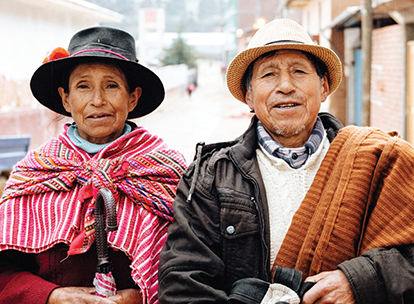A Story From the Americas
He has sent me …
to bestow on them a crown of beauty instead of ashes,
the oil of joy instead of mourning,
and a garment of praise instead of a spirit of despair.
— Isaiah 61:1, 3
In the Lourdes River Basin in the Brazilian state of Rondônia, you’ll find a small indigenous people group named after the hawk. In Portuguese, the gavião is a skillful bird of prey. But Gavião people are on a different kind of hunt, and they are finding what they seek: God’s Word in their own language.
In this group of roughly 500 speakers, most of the older generation has passed away. By the time they’re 15, the Gavião are driving cars and motorcycles, many are married, and they participate in the annual Castanha do Pará, the collection of Brazil nuts, which is the basis of their economy. In short, Gavião youth become active contributors to society, the economy and family life at a very young age.
Gavião believers who obey God’s Word and abandon alcohol abuse, a common social ill in their communities, find their families experiencing freedom from domestic violence and promiscuity. Moreover, as they exchange the fear of spirits for the freedom found in Christ, their lives and villages are transformed.
Gavião Scripture lays a foundation for godly living.
Translating Scripture into Gavião began in the early 2000s and has continued steadily, with Old and New Testament portions, the “JESUS” film and chronological Bible studies becoming available. In Rondônia, biblical transformation began with systematic teaching of the Bible in church services, especially in Sunday school. A spiritually rich culture developed over the years, starting with the very young.
“These young people are the fruit of Bible teachings when they all were children,” says Adilton Campos, the project facilitator. “When they became teenagers, they confessed their faith in Jesus and became strong believers.”
Adilton further explains the biblical education program adopted by the church: “We have specific classes for singles, girls and boys, and for married couples. We have many young married people attending the studies and participating in the worship in the church as well. Because the language is tonal, they are very fond of songs, and we have dozens of worship groups for the youth.”
Biblical principles foster the growth of strong families.
Gavião Bible translators work in the village of Ikolen, a name that means “hawk” in their language and the name by which they identify. When the church announced its first Bible study course for married people there in May 2022, more than 90 couples responded. That represents about a third of the entire language community.
“We were surprised at how many couples came!” Adilton says. “And not only couples, but many young people also attended. The three days of intensive studies have had a strong impact on the lives of Christians who want to follow God’s plans for their families — how to succeed in marriage, raise children and manage finances, among other biblical principles for daily living.
“The Gavião teach God’s will to their children, [which is] often contrary to what they have learned from their grandparents,” explains Adilton. “Whenever the Scripture portions are ready, they request them to read and teach their children at home.”
God’s promises delight and inspire a young Bible translator.
This thriving Christian community yields many personal stories of transformation. Milton, a young college student pursuing a university degree in intercultural studies, is working part-time as a Bible translator. When he and Adilton translated a passage in Revelation, he was suddenly moved. Verse 3:5 states, “Those who win the victory will be clothed like this in white, and I will not remove their names from the book of the living. In the presence of my Father and of his angels I will declare openly that they belong to me.”
Adilton recalls, “We were on a video call where I was in the city and he was in the village. When we finalized the verse, I asked Milton to read the entire verse, and when he finished reading he made an interjection — with a sound of emotion and admiration. I got emotional too, and together we cried with joy to see such a beautiful promise in that verse.”
Adilton and Milton’s diligence, along with the rest of the team, ensures that the young and mighty Gavião hawks will find and capture their prey — solid biblical truth in a language they truly understand.
The Names of Those Who Will Live Forever
Revelation 3:5 (Gavião)
È bó padere átè mán máh ve pov tígí àna ógajá:
“À̱ꞌéhj té ahgó̱e menga pèe sore agá̱hla̱ kíhá máhj kaj Pahdjaj mága zérég kíhr mádigi, ève vé̱pí ná tákaj áleá”, máh ó̱gaj mekaj méne kajá.
“Á̱o̱ tere màga, èꞌéhj sér máxo ahgó̱e̱ ádáríhv ve ákini tásánéh akaj máhj sér ti̱gi̱ Pahdjaj ánéh akosev ti̱gi̱v ká mán sev pí má tígi áleá”, máh ó̱gaj mekaj méne kajá.
“À̱ bàréhj mágaá, bó màga èꞌéhj páná Óhdjaj ába ká kí̱ xinemabólív sarúhréhj ába ká kí̱á è tígi áleá”, máh ó̱gaj mekaj méne kajá.
Revelation 3:5 (Back Translation)
So, the one who looks human kept talking to me in this way: “Those who endure sin, always passing through it, overcome it, and it’s these that God will dress in white clothes, as a reward for them (to have overcome sin),” He said this to me about you. “I will never erase their names from the book of God, where God wrote the names of those who will live forever,” He told me about you. “Here are mine who belong to me, I will say on that day in front of my Father and in front of his servants, the brilliant angels,” he said to me about you.
